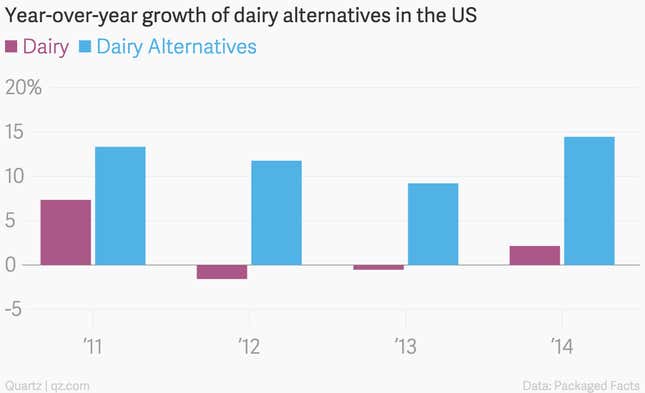This post has been corrected.
Dairy alternatives are really starting to milk the dairy industry.
Products such as almond milk and coconut milk are booming, and starting to swallow milk’s hold on the market. Though dairy beverage sales are still nearly five times more than alternatives’ ($19 billion compared to $4.75 billion), when it comes to growth, alternative milks are swimming laps around dairy in the US. In 2014, sales of dairy alternatives grew 14.5%, while dairy beverage sales grew only 2.2%, according to a new report from the market research company Packaged Facts. In 2010, dairy alternatives only made up 14.5% of the market for dairy and dairy alternative beverages, but by 2014 they made up 20%.

Almond milk, the beloved beverage of hipsters, is the biggest winner, seeing a 40% increase in dollar sales from 2013 to 2014, according to Packaged Facts.
But as the California drought drags on, many are noting that almonds are very thirsty little nuts: It takes 1.1 gallons of water to grow a single almond, and about 80% of the world’s supply of the nuts comes from the state, now in its fourth year of a historic drought.
Could this spell trouble for the almond milk supply chain? WhiteWave Foods Company, which commands a 13% share of the dairy and dairy alternatives beverage market, doesn’t expect to have a problem with its almond milk brand, Silk, said Kevin C. Yost, President of Americas Fresh Foods at WhiteWave, on a May 11 earnings call: “We’re focused on geographic diversity of our land with a focus on well water, groundwater access, so we have no concerns in the short term, but we continue to focus in the long term on conservation and land diversity.”
Though Yost’s comments may sound blasé, they actually reflect the almond industry’s current state of affairs—not that bad—as well as its real efforts to deal with a questionable future. ”In the short term, many growers are not at risk of running out of water,” says Chris Simmons, Assistant Professor at the University of California, Davis College of Agricultural and Environmental Sciences.
But, while almond orchards are switching to groundwater, that comes with its own set of consequences. That’s why, Simmons says, “almond growers are proactive about water conservation,” and are currently investing in research for long-term solutions to a California with less water. He adds, “The almond industry takes the drought very seriously.”
Correction: A previous version of this post stated that Earthbound Farm was WhiteWave’s almond milk brand.
